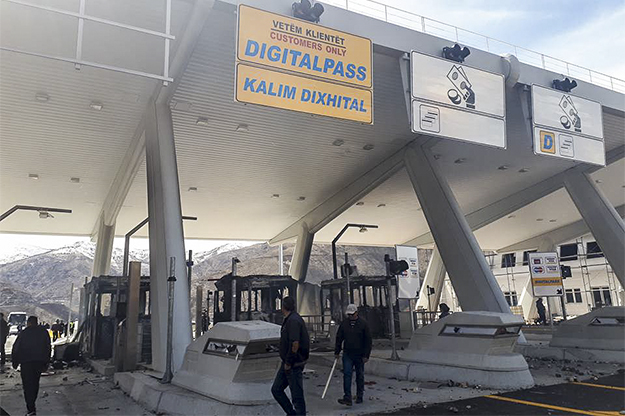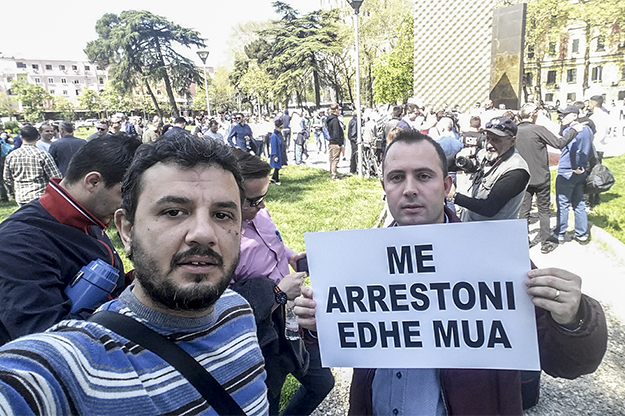The price of 10 extra euros for a round trip to Albania’s capital on a semi-completed highway was unacceptable for the inhabitants of the northern town of Kukës. So they burnt down the toll booths. That’s the short summary of the events that happened on March 31, during a protest that gathered hundreds and won the support of thousands.
Just less than a week earlier, the government had notified that the concession holder of the Milot-Morina highway would start to collect tariffs, making it the first toll road in Albania. Toll rates, which are currently suspended, would range from 2.5 euros for bikes to 5 euros for personal vehicles, and up to 22.5 euros for heavy trucks.
These rates were broadly objected to by sections of the public, but they particularly sparked controversy amongst two groups: the inhabitants of the north eastern area of Albania that the highway passes through and citizens from Kosovo, who visit Albania frequently, particularly during the summer season. The lack of an alternative toll-free road toward Tirana added to the frustration.
The never ending highway
Opened for business in Albania in June 2009, just days before the vote on general elections, ‘Rruga e Kombit’ (‘The Nation’s Road’) has to date cost an estimated 1.3 billion euros, even though the initial estimate was 600 million euros. Despite the original cost having ended up doubled, the project was never fully completed because several segments and works are yet to be carried out. Albania’s minister of infrastructure says a further 300 million euros are still needed to complete it.
In July 2016 a consortium headed by a Turkish company won the tender for the concession of maintaining and operating the highway, as well as the unfinished construction works. It seemed the end of a saga that had seen two governments, that led by Edi Rama and the one led by his predecessor Sali Berisha, trying to announce the winning tender. Just a few weeks later, the consortium forfeited in favor of another consortium made up of international and Albanian companies.
A year later, in September 2017, construction of the toll booths began, while tariffing was due to start that December. However delays meant that it wasn’t until March 25, 2018 that the first test of the toll system began, with charges being levied to drivers of vehicles using the segment of the highway that day. The official start date for implementing the toll was set to have been April 15, but due to the events that would unfold, that date would also be missed.
The first protests against the tariffs on March 28 included a small group of merchants from both sides of the Albania-Kosovo border. The toll passage, in Kalimash, stands between Kukës and Tirana, the main center for leisure and economic activity in Albania. Regular short trips to Albania’s capital are common for individuals from Kukës as well as citizens from Kosovo, whether for work commutes, getting essential supplies for small businesses or simple leisure trips.
The merchants parked their trucks at the border crossing point in Morina, effectively blocking it for a short amount of time. “Instead of removing borders, we’re creating them,” read a sign placed in front of one of the vehicles.

Protests against new highway taxes, which ended with violent clashes between police and protesters, ultimately led to a number of concessions by Albania’s government. Photo: Artur Ibraj.
Demanding exemptions from paying the new bill, next to gather were residents from Kukës, who organized via social networks. The message, signed by “patriotic activists and citizens of Kukës,” and posted amongst other places on the Kukës community Facebook page, stated: “On Saturday, March 31 at 11:30, a civic protest will be held without any political influences. The aim of this protest is stop the unfair taxation of the Nation’s Road, because it damages all Albanians from Kukës and Dardania [a historical reference to Kosovo].”
The message quickly gained support, and citizens from across the district, the poorest in the country in terms of GDP per capita, decided to join. “It’s not a matter of wanting to be privileged,” says Lorenc, 28, a local resident who attended the protest. “It’s about surviving, because if that tariff does happen, it will be the end for many here. Every small business will fail and we’ll plunge deeper into poverty.”
Artur Ibraj made the trip to support the protest at the Kalimash Tunnel from Gruemirë, Shkodër, in northern Albania. Although he is not directly affected by the imposed tariffs, Ibraj says he is within his rights as a citizen to demonstrate against it. “I stand by all those who protect their rights,” he says. “I’m a taxpaying citizen and I have a right to protest because I’ve chosen to stay here in this country and not to go away seeking asylum abroad.”
Intent on revoking the planned toll, the protest escalated into clashes with the police, physical contact and stones being thrown both ways. At least 14 people were injured within the protesters’ and police ranks.
Banging the toll booths with sledgehammers and eventually burning them completed the picture of that day. Right after setting the booths on fire, several protesters even hugged in celebration.
“I came for a peaceful protest. But the police provoked us,” Ibraj says. “They even told some of us: ‘Go home, or your goats will be left on the mountains alone.’ This is a clear insult and irritated the protesters.”
Another protester, speaking on condition of anonymity, also alleged that the police were to blame for the violence. “The police shouldn’t have provoked us that way,” he said. “Throwing rocks at us and using batons to beat unarmed people is not the right way for the state to act.”
Arrests and further protests
Following the protest, Albania’s prime minister, Edi Rama, was forced to make an extraordinary address to the public, condemning the violence and vandalism.
However, Rama also announced a change in policy, similar to in 2013 when public anger at a decision to dispose of Syrian chemical weapons in Albania forced a U-turn.
The countermeasures included a 60-day suspension of the tolling system, during which period the government said it would negotiate with the concessionary company for a reduced tariff for frequent users of the highway. Although not yet confirmed, the government seems to be pushing for a 1.5 euro toll rate for personal vehicles of frequent users of the highway, which would benefit Kukës residents. This however, is still regarded as unacceptable by many.
The public-private partnership contract for maintaining and operating the highway also includes a yearly fund of 120,000 euros to ease the extra costs on the poorer families in Kukës.
Both the Syria weapons and the tolling system incidents share another common factor; a lack of clear communication by the government’s office. In the plenary session of Albania’s Assembly on April 5, Rama acknowledged a lack of clarity in information provided to the public and took responsibility for not having done enough to address the issue earlier.
Meanwhile, arrest warrants were issued for 23 protesters. In the early morning after the incidents Special Forces and Rapid Intervention Units proceeded to arrest the suspects, with prosecutors requesting pretrial detention or house arrest for 16 of them.
The arrests sparked another public backlash, and gave birth to a hashtag movement called #unejamkuksian (I am from Kukës). Small crowds, including some opposition MPs, gathered outside courthouses in support of the protesters. The court in Tirana decided that 11 of the protesters should be kept under arrest, a decision that the Court of Appeal in Shkodra later partially overturned by releasing seven of the accused.

Protester Artur Ibraj (right) says that if necessary he would be ready to join a hunger strike in support of fellow protesters who are in prison. Photo: Pano Soko.
“I stood and I will stand by those in their right to protest,” says Ibraj, who joined protesters outside the courthouse in Shkodra. “I will continue going to gatherings for them to be released. I will even join a hunger strike if I have to.”
Split road, split economies
Concern has also been expressed at the economic impact of the tariffs. The Union of Albanian Producers has said that taxing one of the country’s main transport arteries will affect all small exporters and importers with a cargo value of under 10,000 euros.
“The sectors that will feel the biggest impact are the producers and exports of fruits and vegetables, bricks, cement and bottled water,” warns the union. “This will force the prices for these products to increase by 7-12 percent. This translates to an immediate loss of our market share in Kosovo and in the region.”
The Union of Trade Chambers of Albania has expressed a different opinion, stating that the tariffs are just, based on the investments and maintenance costs of the concessionary of the highway.
On the other side of the border, businesses seem to be more united on the idea that it puts additional strain on existing trade barriers with Albania. The Kosovo Manufacturers Club has estimated that the cost per kilometer of the new tariff for trucks will be higher than elsewhere in the region, at an estimated 20.3 cents/km in Albania compared to 14.2 cents/km in Serbia and 16.5 cents/km in Macedonia. It also points out that road safety measures on the highway are lacking, signalling is missing and parts of the road are unfinished.
Interest groups in Kosovo want their government to negotiate with Tirana to lower the tariffs. However, communication channels between the two countries on the issue have been lacking, with Kosovo’s Minister of Infrastructure starting on March 25 that Kosovo was not consulted on the decision to apply the tariffs.
Prishtina has also said that it plans to apply tariffs on its own part of the road, the ‘Ibrahim Rugova’ highway. If this were to happen, economic experts argue that it could well discourage business relations and the exchange of goods between the two countries — which according to official statistics declined last year — still further.
Round two?
So far two main actors have had their say on this situation: the people of Kukës and businesses on both sides of the border. Next in line are the citizens of Kosovo, with hundreds of thousands traditionally visiting the Albanian coast for summer vacations each year, although the number of visitors has been in decline. Last year, Kosovo citizens entering Albania declined by 19.1 percent, a dramatic decrease of 400,000 less individuals crossing the border.
“It’s a pity that they’ve put this tariff on us,” says one of the protesters from Kosovo, 44-year-old Blerim, who says he will be making less trips to Albania from now on. “Everyone knows that it will mainly affect us coming to Albania. It’s shameful what they’re doing.”
Round two begins when the tourist season in Albania officially opens, on June 1, just as the delayed tariffs are due to kick in.K
Feature image: Angelo Haruni.



